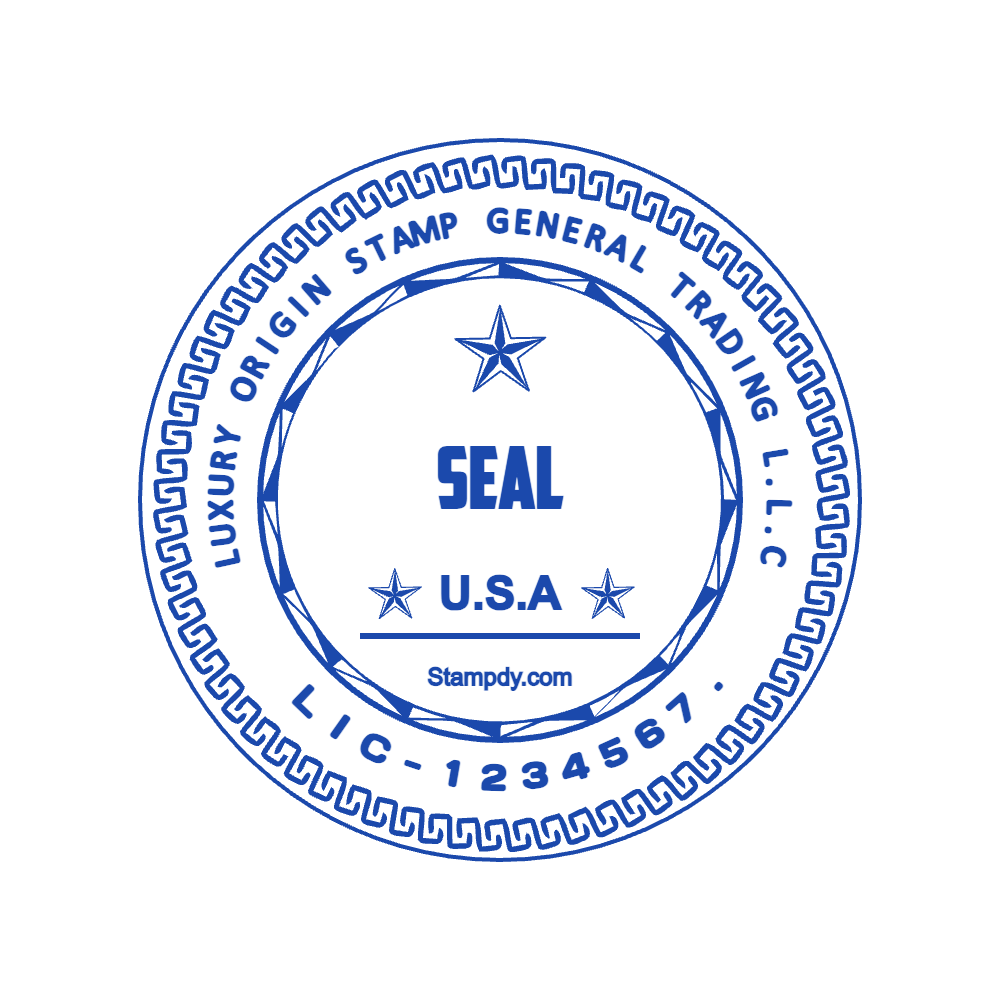Company Seals Templates
Free editable company seals templates for online editing
Found 13 company seals Templates












Company Seals: What They Are, Uses, and How to Pick the Right One
If you own or run a company, you’ve likely heard of a company seal—sometimes called a corporate seal or common seal. It’s more than just a stamp; it’s a formal tool that adds legal weight to important business documents, showing that a decision or agreement is approved by the company. At Stampdy, our company seal templates are designed to meet business needs—from small startups to established firms—blending professionalism and practicality. This guide breaks down the basics of company seals: what they do, when to use them, and how to choose one for your business.
What Is a Company Seal, and Why Do Companies Need It?
A company seal is a specialized stamp that imprints a company’s key details—usually the company name, registration number, and sometimes a logo or founding year—onto documents. Historically, it was a legal requirement for most businesses to use a seal to make contracts or official papers binding. While modern laws have relaxed this in many countries (you can often use a signature instead), company seals still matter for three big reasons:
- Legal clarity: Some formal documents (like property deeds, loan agreements, or international contracts) still require a company seal to be considered valid—especially in countries like Japan, Singapore, or parts of Europe.
- Professionalism: A company seal adds a polished, official look to documents. Clients, partners, or investors often see it as a sign of a serious, well-run business.
- Security: Seals are harder to forge than signatures, reducing the risk of fraud when dealing with sensitive paperwork.
Think of it like a company’s “official signature”—it’s a way to say, “This document represents our company’s decision, and we stand behind it.”
Common Types of Company Seals
Company seals aren’t one-size-fits-all. The type you need depends on your business size, industry, and the documents you handle. Here are the three most common types:
1. Basic Company Seals
These are simple, no-frills seals that include the essentials: company name, registration number, and sometimes the country or state of registration. They’re perfect for small businesses or startups that need a seal for basic legal documents.
Who needs it:
- New businesses getting set up with legal paperwork (like articles of incorporation).
- Small companies that handle a few formal documents a year (e.g., vendor contracts).
2. Logo Company Seals
Logo company seals add your business’s logo to the design, along with the standard company info. They’re great for businesses that want to blend formality with branding—every document with the seal also promotes your brand.
Who needs it:
- Companies that work with clients or partners regularly (e.g., marketing agencies, consulting firms).
- Businesses in customer-facing industries (like retail or hospitality) that want to reinforce their brand on official papers.
If you’re adding a logo, make sure it’s high-resolution to avoid blurry impressions. Our online stamp design maker lets you test how your logo fits with the company info, so you can tweak before ordering.
3. Multi-Purpose Company Seals
These seals have extra features, like an adjustable date or a section for an authorized signature. They’re ideal for businesses that process lots of documents and need flexibility. For example, a multi-purpose seal might let you stamp the date of approval alongside the company info.
Who needs it:
- Large companies or corporations with multiple departments (e.g., HR, legal, finance) handling documents.
- Businesses that work with international clients (adjustable dates help with time zone or regional requirements).
How to Choose the Right Company Seal
Picking a company seal is straightforward—focus on your business’s needs and legal requirements. Here’s how:
1. Check Local Laws First
Before you design a seal, find out if your country or state has rules about what it must include. For example:
- Some places require the company’s full legal name (not a nickname) and registration number.
- Others have size limits (e.g., the seal must be at least 2cm in diameter for legal documents).
Your lawyer or business registration office can help you confirm the rules—this avoids having to redo the seal later.
2. Decide on Key Info to Include
Stick to what’s necessary—too much text will make the seal cluttered and hard to read. Must-have info usually includes:
- Full legal company name (exactly as it appears on your registration papers).
- Company registration number or tax ID.
- Country/state of registration (if required by law).
Add a logo only if it fits—don’t cram it in if it makes the text small.
3. Choose Durability for Frequent Use
Company seals are meant to last for years, so pick a durable material:
- Polymer: Our top choice for most businesses. It’s tough, makes sharp impressions, and doesn’t wear down easily.
- Metal: For companies that want a premium look (e.g., law firms, financial institutions). Metal seals are more expensive but extremely durable.
If you’ll use the seal often (once a week or more), go with a self-inking model—it has a built-in ink pad that saves time and avoids mess. Our stamp maker online has self-inking options for all company seal templates.
4. Pick the Right Size
Size depends on the documents you’ll stamp:
- Small (2–3cm): For small papers like contracts or invoices.
- Medium (3–4cm): Versatile—works for most legal documents and certificates.
- Large (4–5cm): For big papers like property deeds or annual reports (where visibility matters).
Tips for Using Your Company Seal
Once you have your seal, these simple tips will keep it working well and your documents valid:
- Only let authorized people use it: The seal should be kept by a trusted employee (like a CEO, legal manager, or office admin) and used only for approved documents. Keep a log of who uses it and when—this helps with accountability.
- Stamp clearly: Press the seal firmly but evenly on a flat surface. Faint or smudged impressions might not be accepted for legal documents.
- Store it safely: Keep the seal in a locked drawer or safe when not in use. Lost or stolen seals can lead to fraud, so treat it like a valuable business tool.
- Refill ink on time: Self-inking seals need ink refills every 5,000–10,000 impressions. If the impression fades, refill it right away—don’t wait until it’s unreadable.
Common Questions About Company Seals
Q: Is a company seal legally required for my business?
A: It depends on where you’re based. In the U.S., UK, and Canada, most businesses don’t need a seal by law—signatures work for most documents. But if you do business internationally or handle specialized papers (like property), a seal might still be required. Check with your lawyer to be sure.
Q: Can I use a digital company seal instead of a physical one?
A: Some countries accept digital seals for online documents (e.g., e-contracts). But physical seals are still preferred for hard copies, especially legal or government papers. Many businesses keep both—a digital seal for online work and a physical one for in-person documents.
Q: How long does a company seal last?
A: With proper care, a physical company seal can last 5–10 years. Polymer or metal seals hold up best—rubber seals might need to be replaced sooner if used often.
Q: What if my company changes its name or logo?
A: You’ll need a new seal—old seals with outdated info aren’t valid for legal documents. We offer a 15% discount on replacement company seals for existing customers, so updating is easy.
Why Choose Stampdy for Your Company Seal?
When you’re buying a company seal, you need something reliable, legal, and professional. Here’s why our templates work:
- Law-compliant designs: We make sure our seals include all the info required by most countries, so you don’t have to worry about legal issues.
- Customizable: Add your logo, adjust the size, or pick ink color—our tool lets you make a seal that fits your business.
- Durable materials: We use polymer and metal to ensure your seal lasts for years, even with frequent use.
- Fast delivery: Most company seals ship in 1–2 business days, so you can start using it right away.
If you’re ready to get a professional, legal company seal for your business, browse our templates today. Whether you need a basic seal or one with your logo, we’ll help you create something that works for your company’s needs.